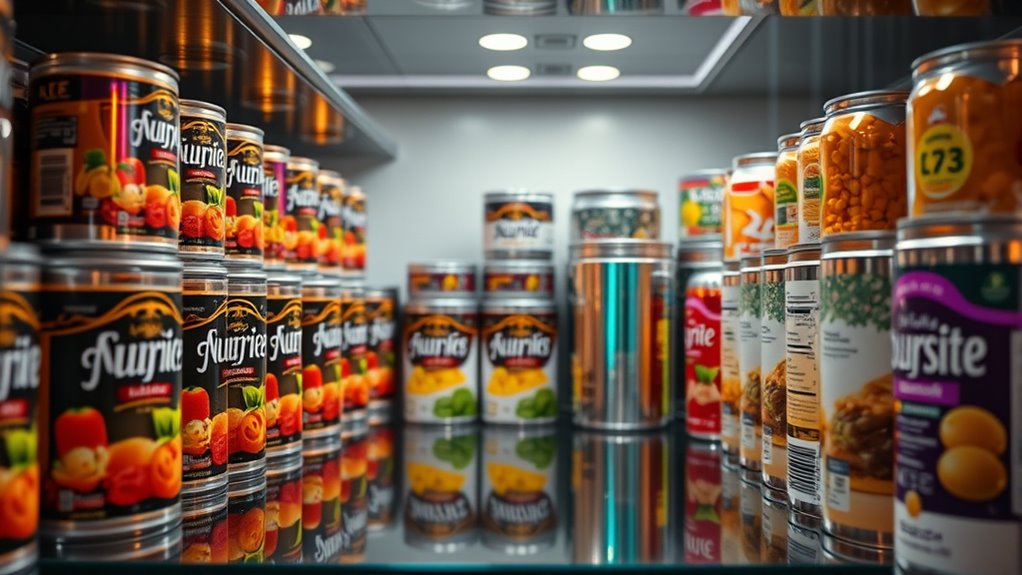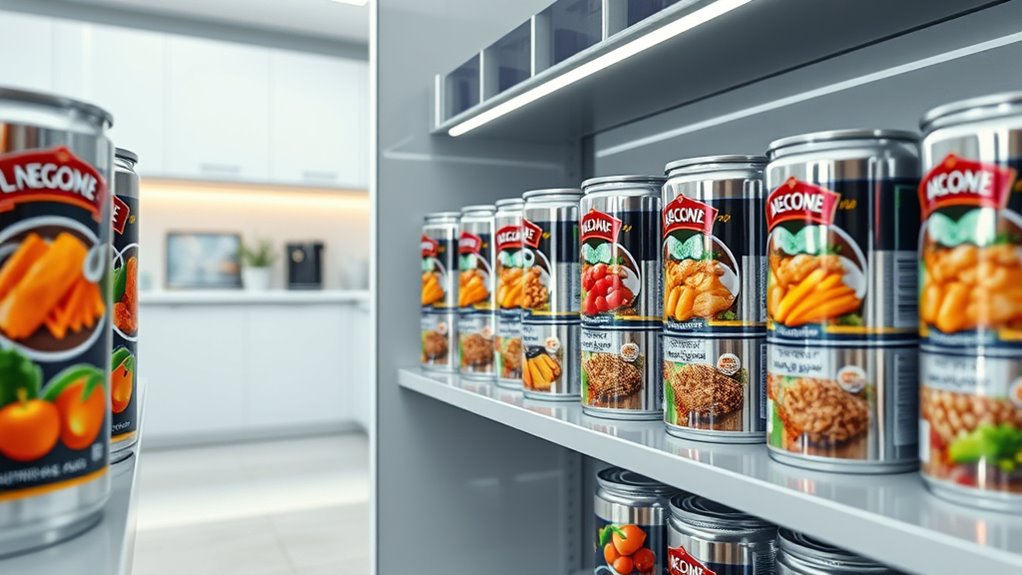Canned foods remain a reliable and nutritious pantry staple in 2025 thanks to advanced processing techniques. Modern methods like high-pressure processing and retort sterilization guarantee safety, preserve flavor, texture, and essential nutrients, and extend shelf life for years. These innovations prevent spoilage and retain crucial vitamins and minerals, making canned options a convenient, long-lasting choice for healthy eating. Keep exploring to discover how these advancements continue to enhance food quality and safety.
Key Takeaways
- Advanced canning methods preserve maximum nutrients, flavor, and color of fruits and vegetables for long-term storage.
- Modern processing techniques ensure food safety by eliminating harmful bacteria and preventing spoilage.
- Innovations like high-pressure processing enhance nutrient retention and uniform heat distribution.
- Canned foods offer a reliable, long-lasting nutritional source suitable for emergencies and everyday use.
- Improved sealing technologies maintain taste, texture, and nutritional quality over extended shelf lives.

The processing techniques used in canning are carefully designed to maintain as much nutritional value as possible, even after years of storage. For instance, the application of heat during sterilization kills harmful microorganisms and inactivates enzymes that cause decay. This heat treatment is meticulously controlled to avoid overprocessing, which can degrade nutrients like vitamins and minerals. Modern canning facilities often incorporate techniques such as high-pressure processing or retort sterilization, which provide uniform heat distribution and better preservation of flavor and nutrients. These methods also help retain the texture and color of fruits and vegetables, making canned foods appealing and nutritious even after extended storage. Additionally, advances in canning technology continue to improve nutrient retention and food safety standards, ensuring canned foods remain a reliable source of nutrition. You might wonder how these techniques influence the shelf life of canned goods. Well, by effectively killing bacteria and sealing the container airtight, they prevent new microorganisms from contaminating the food. This creates an environment where spoilage is virtually impossible without opening the can. As a result, canned foods can stay edible and safe for years, making them an excellent choice for emergency preparedness, long-term storage, or simply reducing food waste. Plus, the controlled processing techniques help lock in the taste, making canned foods as flavorful as their fresh counterparts in many cases. When you choose canned foods, you’re relying on a technology that balances safety, nutrition, and convenience. The combination of careful processing techniques and a robust sealing process ensures that your canned items remain nutritious and safe long after purchase. Whether it’s a can of tomatoes, beans, or fruit, you can count on the processing methods to preserve its quality. This reliability is what keeps canned foods relevant in 2025 and beyond, providing a dependable source of nourishment that can be stored for years without losing its value.
Frequently Asked Questions
How Do Canned Foods Impact Long-Term Storage Health?
Canned foods positively impact your long-term storage health by offering excellent shelf stability, allowing you to keep nutritious options for years. They preserve nutrients effectively when properly sealed and stored, ensuring you get essential vitamins and minerals over time. Just make sure to check expiration dates and avoid damaged cans. This way, canned foods remain a reliable, convenient, and nutritious pantry staple, supporting your health during emergencies or planned meals.
Are There New Canning Technologies Improving Nutritional Retention?
Yes, new canning technologies are enhancing nutritional retention by improving canning preservation methods. You’ll find that innovations like high-pressure processing and vacuum sealing help maintain nutrient stability better than traditional techniques. These advancements reduce nutrient loss during preservation, ensuring your canned foods stay healthier for longer. As a result, you can enjoy nutrient-rich meals with improved flavor and texture, making your pantry staples more nutritious and convenient.
What Eco-Friendly Packaging Innovations Are Emerging for Canned Foods?
Imagine your canned foods wrapped in plant-based packaging that’s gentle on the planet. You’ll see innovative eco-friendly packaging using biodegradable coatings, which break down naturally and reduce waste. These advancements make your pantry choices more sustainable without sacrificing quality. As you shop, you can feel good knowing that these forward-thinking solutions help protect the environment, all while keeping your favorite foods fresh and delicious in eco-conscious containers.
How Do Canned Foods Compare to Fresh in Nutrient Absorption?
Canned foods often have comparable nutrient bioavailability to fresh produce because processing methods maximize vitamin stability and preserve essential nutrients. While some vitamins, like C and B complex, may degrade over time, proper canning techniques help retain most nutrients effectively. You can enjoy canned foods as a nutritious alternative, especially when fresh options aren’t available, ensuring you still get essential vitamins and minerals with minimal nutrient loss.
What Are the Best Practices for Recycling Canned Food Containers?
To recycle canned food containers effectively, you should rinse them thoroughly to remove any food residue. Use proper recycling methods by checking local guidelines for metal can recycling, and avoid contaminating other recyclables. Consider container reuse by repurposing cans for storage or DIY projects before recycling. This approach reduces waste, conserves resources, and supports environmental sustainability, making sure your recycling efforts make a meaningful impact.
Conclusion
As you stock your pantry with canned foods, you’re embracing timeless convenience and nutrition, much like a trusty Swiss Army knife. These staples keep your meals versatile and your fridge clutter-free, proving their worth even in 2025’s fast-paced world. Just like a good old floppy disk, canned foods may seem outdated, but they still hold immense value. So, keep them handy—you’ll always have a delicious, nutritious backup, ready to transform your culinary adventures in a flash.









